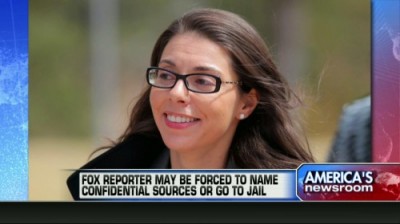Fox News reporter Jana Winter’s case is not garnering much attention from the main stream media. Some have vehemently suggested that if Winter wrote for the New York Times instead of Fox, her liberal peers would be up in arms over the government pressure heaped upon the Colorado reporter to name her sources.
Jana Winter is potentially facing a jail sentence if she refuses to tell authorities the names of law enforcement officers who told her about a notebook kept by Aurora movie theater shooter James Holmes. The mass murderer allegedly sent the notebook full of evil ramblings to his psychiatrist before the Colorado shooting.
James Holmes’ defense attorneys are currently attempting to convince the trial judge to force Jana Winter to tell the court how she initially obtained the information. While Winter is protected by the Colorado journalist shield law, the First Amendment privilege is not absolute. A total of 31 states have some type of legislation allowing professional journalists to protect their sources.
At first glance the Jana Winter case might seem wholly like a Colorado problem, but if the journalist is formally charged by the court, a precedent of government intrusion has been set.
State shield laws are integral to the ability of journalists to do their job. Just like whistleblower protections, the laws which protect reporters also potentially protect the public. Judge Andrew Napolitano aptly summed up the importance of the Jana Winter case during an interview on Fox News on Monday.
Judge Napolitano told Martha MacCallum that Winter’s article about James Holmes’ notebook was vital to the public interest. If the Aurora movie theater shooting trial judge agrees with Napolitano, Winter will not be forced behind bars to keep the names of her law enforcement sources private.
Napolitano had this to say during the Jana Winter interview:
“She not only didn’t do anything wrong, she did a profound good by getting these notes and revealing their existence, and now they want to put her in jail.”
The “vital public interest” aspect of the journalist shield law is one of the most important building blocks of actually having a free press in America. Without such laws, the government or companies could stifle the release of information that the public truly needs to know.
If a journalist could not promise a source that they would go unnamed when sharing information about what happened in Benghazi or a problem at a Monsanto plant, for example, an injustice which could impact our health and well-being could easily (and repeatedly) occur.
Without staunch freedom of the press statutes, the American public would be no better informed than the residents of North Korea or Cuba. Few, if any, would dare to speak out about government or business wrongdoing if journalist shield laws and whistleblower protections could be circumvented.
Freedom of the press is guaranteed by the First Amendment. The Constitution says, “Congress shall make no law that abridged the freedom of speech, or of the press.” The text literally only mandates that such freedom cannot be infringed upon by Congress, but the U.S. Supreme Court enlarged the scope of the First Amendment to include press and speech censorship by any type of governmental entity.
The government is only permitted to place a limit on free speech under several very specific circumstances. The U.S. Supreme Court ruled that a reporter could be required to reveal a source only if the individual broke a federal law when leaking the information for publication.
In 2005, New York Times journalist Judith Miller spent 85 days in jail after being charged with contempt of court for refusing to name an undercover CIA agent as a source. In 2006, two San Francisco Chronicle reporters also went to jail for refusing to name a source who shared grand jury testimony about a Barry Bonds perjury case. While the testimony about the super-star athlete’s trial was merely sensational fodder and does not, in my opinion, meet the “vital public interest” standard, the name of an undercover CIA agent whistleblower surely should have been protected.
What do you think about Jana Winter and First Amendment infringement that flies in the face of Constitutional freedom of the press mandates?
 Off The Grid News Better Ideas For Off The Grid Living
Off The Grid News Better Ideas For Off The Grid Living





